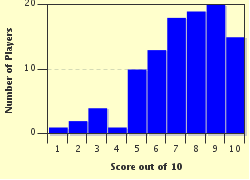Quiz Answer Key and Fun Facts
1. "The First Teacher" - Alexander the Great - Lyceum
2. "Elements" - Father of Geometry - Axioms
3. "Almagest" - Geocentric - Alexandria
4. Eureka! - Lever - Calculus
5. Four Humors - Anatomy - Circulatory System
6. Doctor Mirabilis - Scientific Method - Optics
7. "Liber Abaci" - Numbers - Pisa
8. Scholasticism - Father of Thomism - "Summa Theologiae"
9. "Mishneh Torah" - Medical Works - The Second Master
10. Bishop of Lincoln - Resolution and Composition - Founder of Modern Science
Source: Author
ponycargirl
This quiz was reviewed by FunTrivia editor
bloomsby before going online.
Any errors found in FunTrivia content are routinely corrected through our feedback system.

